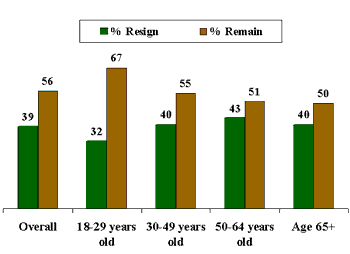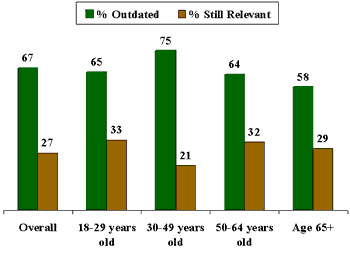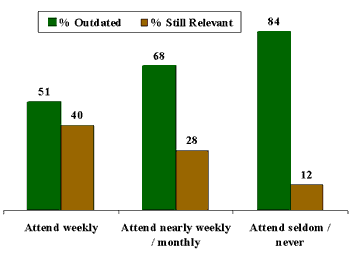GALLUP NEWS SERVICE
PRINCETON, NJ -- Pope John Paul II arrived in Canada on Tuesday for World Youth Day festivities. The event brings together Catholics between the ages of 16 and 35 from around the world. The frail pope surprised observers by descending the steps from his jet to the tarmac upon his arrival, something he had not done on recent trips. Despite his failing health and rumors about a possible resignation, most American Catholics believe the pope should remain in office. The North American trip, which also includes stops in Mexico and Guatemala, promises to give some positive publicity to a church rocked by a sex abuse scandal this year. Given the church's intent to use the trip to reach out to young Catholics, it is worth noting that most Catholics believe that their church's teachings on sexual behavior are outdated.
No Consensus for Pope to Resign
There has been much speculation about the pope's health in recent years, and its impact on his ability to lead the Catholic Church. The 82-year-old pontiff is battling Parkinson's disease and arthritis, which makes it difficult for him to stand, walk and even speak clearly. The pope has given no indication, however, that he will step down from the papacy, something no sitting pope has done in more than 700 years.
Gallup polling of American Catholics conducted between April 29 and June 8, prior to the World Youth Day visit, shows that most Catholics believe the pope should remain in office rather than resign for health reasons, by a 56% to 39% margin. Two-thirds of Catholics between the ages of 18 and 29 say the pope should remain in office, and 55% or fewer Catholics in all other age groups say the same.
| Should Pope Resign or Remain in Office? |
 |
| April 29-June 8, 2002 |
Surprisingly, practicing and non-practicing Catholics (as defined by how often they attend church) differ little in their opinion of what the pope should do. A majority (54%) of non-practicing Catholics -- those who "seldom" or "never" go to church -- believe he should remain in office. That is about the same percentage as practicing Catholics -- 56% of those who attend church "weekly" believe the pope should remain in office -- and of Catholics who attend church "nearly weekly" or "monthly" (57%).
Catholics Skeptical About Church Teachings on Sex
The pope's visit is designed to energize young Catholics from around the world. However, one widely heard claim is that the church's teachings on premarital sex and cohabitation, artificial birth control, divorce and homosexuality are not attractive to younger people, who tend to be somewhat more socially liberal than older people. Overall, Gallup polling conducted between May 28 and June 30 shows that two in three American Catholics believe that the church's teachings on sexual behavior are outdated, while just 27% think they are still relevant today. But perhaps contrary to assumptions, young Catholics are no more likely than older Catholics to believe the church's teachings on sex are out-of-date. Catholics between the ages of 18 and 29 are about as likely as those older than age 50 to say that the teachings are still relevant today, and are more likely to say this than Catholics between ages 30 and 49.
| Catholics' Views on Church Teachings on Sexual Behavior |
 |
| May 28-June 30, 2002 |
Not surprisingly, more committed Catholics (those who attend church weekly) are much more likely to agree with the church's teachings on sex than those who attend mass less regularly. However, even a slim majority of committed Catholics (51%) say that the church's teachings are outdated. By contrast, more than two-thirds of Catholics who say they attend church nearly every week or on a monthly basis say that church policy on sexual behavior is outdated, and greater than eight in 10 Catholics who seldom or never attend church say this.
| Catholics' Views on Church Teachings on Sexual Behavior, by Church Attendance |
 |
| May 28-June 30, 2002 |
The results are similar when looking at political ideology, as self-described liberal (79%) and moderate (71%) Catholics are significantly more likely to say the church's teachings are outdated than are conservative Catholics (57%). But, despite these differences, a majority of all three groups believe the teachings are outdated.
Survey Methods
These results are based on telephone interviews with a randomly selected national sample of 665 Catholics, aged 18 and older, conducted April 29-June 8, 2002, and 694 Catholics, aged 18 and older, conducted May 28-June 30, 2002. For results based on these samples, one can say with 95% confidence that the maximum error attributable to sampling and other random effects is ±4 percentage points. In addition to sampling error, question wording and practical difficulties in conducting surveys can introduce error or bias into the findings of public opinion polls.
